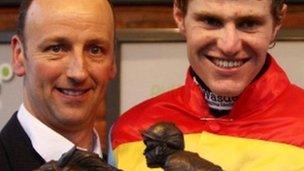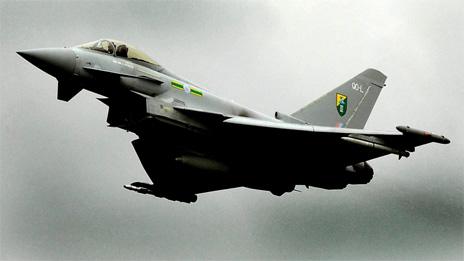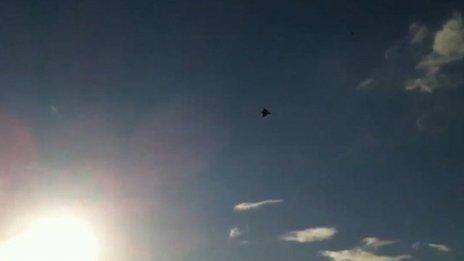Sonic boom helicopter passengers 'lucky to be alive'
- Published

Mr Knott (left) was flying back from the races at Aintree when the incident happened
A family had a "lucky escape" when a helicopter was spun round by supersonic jets during a false hijack alert.
Racehorse owner Anthony Knott, 47, and his family, from Dorset, were flying home on Thursday when the helicopter they were in sent a distress signal.
Two Typhoons flew to the scene over the Cotswolds causing a sonic boom that was heard across central England.
Mr Knott said they only surivived turbulence from the jets because they were in an ex-military helicopter.
"It was like being in Top Gun or something," he told BBC News.
"All of a sudden this plane came from underneath us. The turbulence sucked us round 30 degrees and the pilot said we were lucky to be alive."
The helicopter was flying near Bath when it was intercepted.
Pilot in shock
Emergency services in the West Midlands, Oxfordshire and south-west England received numerous calls about the sonic boom caused by the Typhoons authorised to go at supersonic speed.
Bath resident Ric McLaughlin captured a sonic boom in 2012 when a Typhoon jet was responding to an emergency call
The MoD confirmed they were responding to an emergency call from a helicopter.
It later said that the pilot had transmitted the wrong signal by mistake.
Mr Knott, from Sturminster Newton, said the pilot was in shock when one of the jets came past them.
"He said if the helicopter hadn't been ex-military we would have been dead."
'Thrown around'
Mr Knott said he had watched his horse come third in the Liverpool Hurdle at Aintree and was a first-time passenger in the helicopter with his son and daughter when the jets arrived.
He added: "The pilot said to us, 'hang on, we're going to catch this turbulence' and it was like being in a bouncing ball.
"We were all strapped in but we got thrown around the aircraft."
He said he only saw one of the Typhoon aircraft that had been scrambled but on its first pass the pilot could not have been more than 200m (650ft) away.
The plane passed by the helicopter two more times communicating with the helicopter pilot before flying away, according to Mr Knott.
He said he did not know anything about the emergency signal and had not been able to hear the communication between the two pilots.
He added: "Our pilot was just in shock. He was quite angry and when we landed he went off to find out why it had happened."
- Published13 April 2012

- Published13 April 2012
